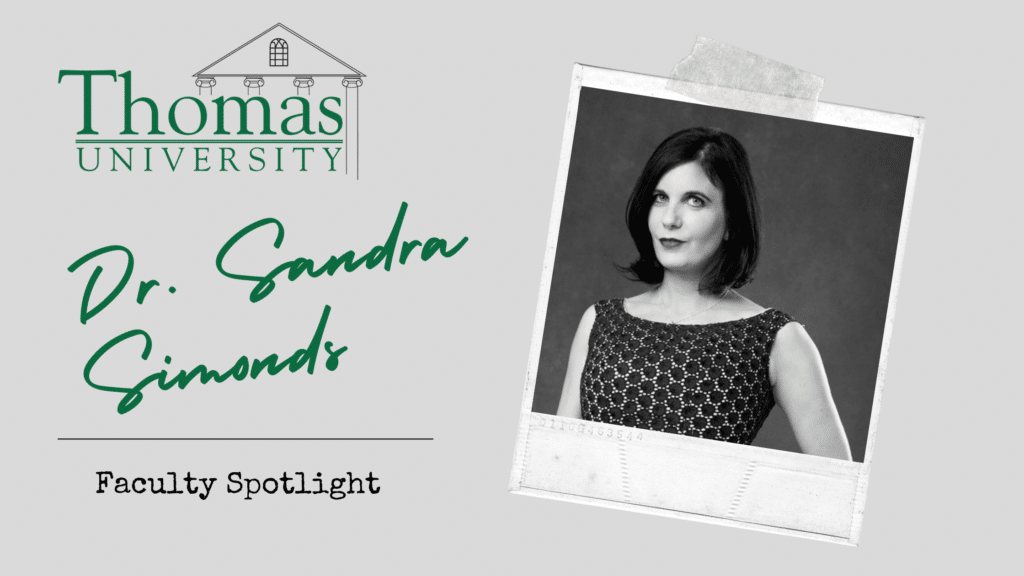Meet Dr. Sandra Simonds, Associate Professor of English at Thomas University, and read about her life-long passion for literature and creative writing.
What program do you teach at Thomas University? What drew you to this field of study? What keeps you excited about it?
I teach in the Humanities Department at Thomas University. Mostly, I teach creative writing and literature (at every level) from first-year college students to graduate students. Since I was a little girl, I’ve been writing poetry and stories, so it felt very natural to study creative writing when I went off to college.
I love teaching creative writing because it’s a field where students can learn so much about themselves and their communities. The classes are workshop-based so they get to know each other through their writing in profoundly personal and moving ways. What keeps me excited are the students here! Our students come from such diverse backgrounds, so I feel like I’m always learning something new.
What attracted you to Thomas University to teach at? What sets them apart?
Thomas University is a place where students get individual attention from their professors. I went to huge state schools where sometimes I didn’t even meet the professors since classes were often taught by teaching assistants. Individual attention nurtures students and allows them to grow at their own pace.
I enjoy the small class sizes and the diversity of our student body. We have a large population of international students who come from all over the world, which is very energizing. I’ve taught students from Zimbabwe, Sweden, Brazil, etc., so the variety in life experiences has been wide, and it helps students expand their thinking.
What is your professional background as an educator?
I earned a Ph.D. in Poetry at Florida State University, an M.F.A. in Poetry at the University of Montana, and my undergraduate degrees in Psychology and English (Creative Writing) at University of California, Los Angeles. I was a graduate instructor in English at FSU and UM, but Thomas University was my first “real” teaching job. I started part-time at Thomas University during my last year of my Ph.D., and I was hired full-time the next year.
Tell us a little about yourself. Why did you become interested in English?
When I first read Romeo and Juliet in sixth grade, I remember enjoying the sounds of the language so much that I read the entire thing out loud to myself in my bedroom. I don’t know if I completely understood everything Shakespeare was saying, but I loved experiencing the musicality of the words. I wanted to become a writer from an early age, so English was a great fit for me.
I spend a lot of my free time writing. I have published seven books of poetry, and my eighth book, Triptychs, is forthcoming from Wave Books. I am also a poetry critic and review books. I’ve published my poems and reviews in the New Yorker and the New York Times.
What would you tell prospective students considering your program about yourself? What’s something that students and colleagues should know about you?
People should know that our classes are simultaneously fun and challenging. They should be prepared to share their work with their classmates and get constructive feedback on their writing. We foster a safe and open learning environment where all perspectives are heard. They should also know that at TU we value free thought and dialogue and that all are welcome.
I think sometimes there is a misconception that creative writing is a class that you can take for an “easy A.” Creative writing can be quite challenging because it can be hard to write “without rules.” That said, it is also incredibly freeing. Literature classes are wonderful because when you read and learn about other lives and other life situations, ideally, it helps build your values and create a sense of empathy for others. Great literature challenges many of our cherished beliefs and helps us look beyond ourselves to better understand the world.
What advice do you have for students interested in pursuing their English degree? How can people stand out in this field?
There is so much you can do with an English degree. Workplaces are always desperate for good writers, good communicators, and people who are interesting and creative. Studying literature and creative writing gives you those tools and so much more.
Is there anything else you would like to share?
If you memorize a poem, it will come back into your mind when you need it the most!

